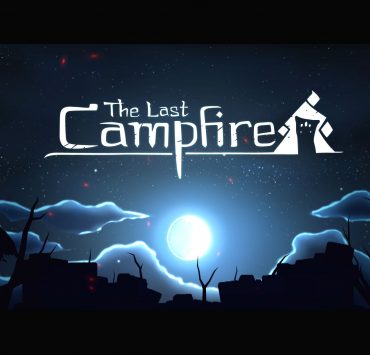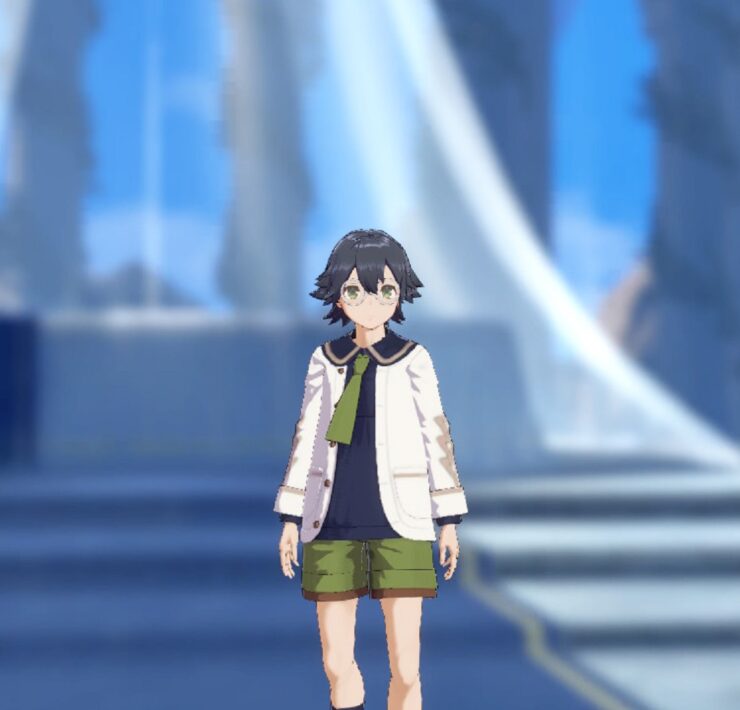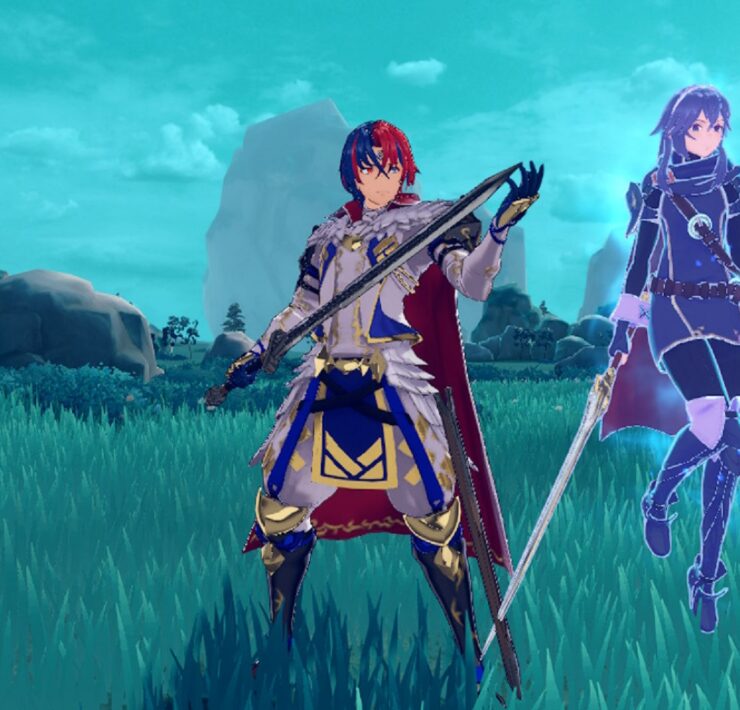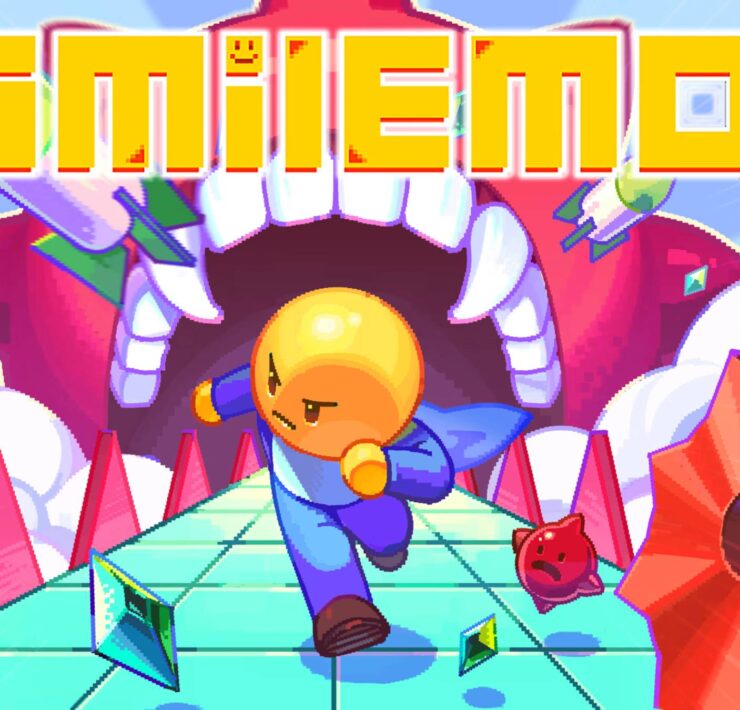No Straight Roads Switch Review – On the Road Again

No Straight Roads joins the pantheon of modern, modest-budgeted action platformers like A Hat in Time and Yooka Laylee. Games which hearken back to the PS1 and PS2 golden years of the genre. It’s a retro style that has been building momentum in recent years, to the delight of countless gamers – this reviewer included. Unfortunately, while its heart is absolutely in the right place, and its name is stylishly evocative, No Straight Roads stumbles constantly, and falls often.
No Straight Roads is a colourful and campy modern action platformer, and the debut release from Malaysian studio Metronomik. The game’s story could easily have been found in the dusty journals of an edgy teenage Jack Black, and we have no proof that this isn’t the case.
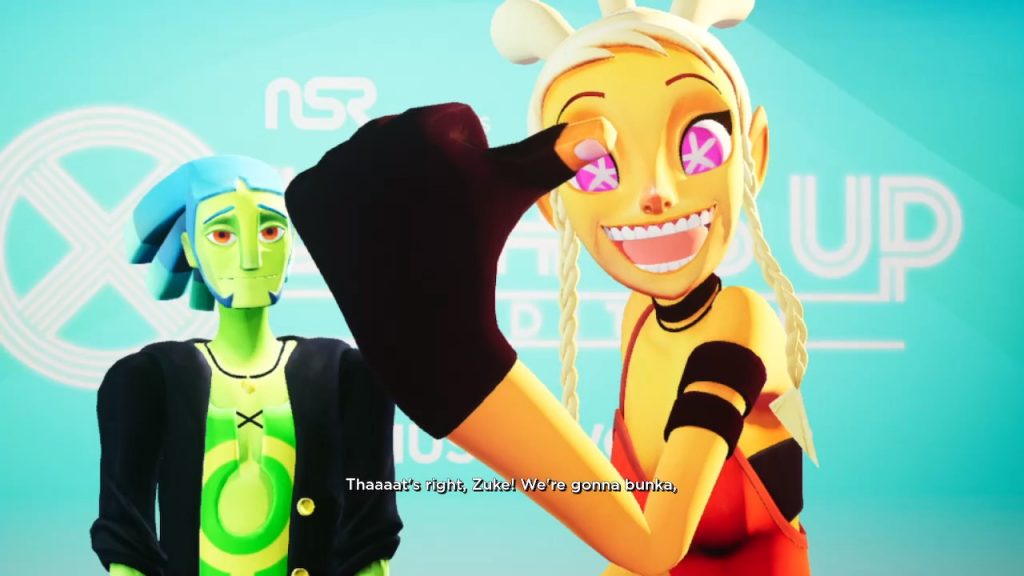
The narrative follows a rock duo by the names of Mayday – the guitarist, and Zuke – the drummer. Mayday is a bubbly, hopeful, fiery young woman who wields her guitar like an axe (get it?), while Zuke is a definitely stoned and laid-back drummer who wields his sticks like a pair of clubs and plays electric drums that appear out of thin air.
Mayday and Zuke are the last bastions of rock ‘n’ roll in a world where the genre once thrived. In the metropolis of Vinyl City – the aesthetics of which are heavily reminiscent of Bladerunner and the Tokyo district of Harajuku – EDM is the music of the people, monopolised by the evil government/corporate overlords NSR (No Straight Roads). NSR have taken control of the city through the power of EDM, and it’s up to the musical duo Mayday and Zuke – who, together, comprise the band Bunk Bed Junction – to bring back rock ‘n’ Roll and put a stop to EDM once and for all.
Depending on how much of a cynic you are, the story of No Straight Roads can be read as awkward cringe or charming and heartfelt. For this reviewer, there was a constant fluctuation between the two. When Mayday waxes lyrical about former rock gods and the state of the city, it comes off as sweet and almost inspiring. When they enter a battle and Mayday yells “Let’s rock-a-tock!” it comes off as so intensely cringe, you’ll want to eat your own joycons rather than keep playing.
The game’s writing certainly comes from a place of true love and appreciation for rock music, and most music fans can appreciate that. Sometimes it works and sometimes it doesn’t, but it ultimately provides enough of a charming setup to steer the action in the right direction.
While No Straight Roads can be categorised as an action platformer, the platforming is comparatively light, mostly being used during city exploration in order to reach the plentiful collectables strewn about the streets of Vinyl City. It’s the action that’s the crux of No Straight Roads’ gameplay, and that is, unfortunately, where the game falters.
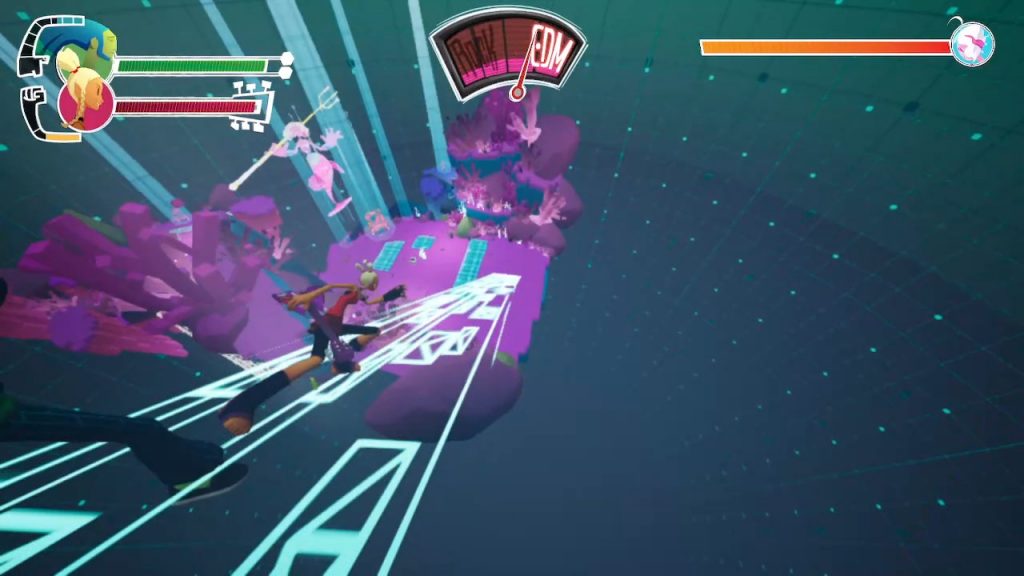
The combat in No Straight Roads feels very reminiscent of PS2 action platformers like Jak and Daxter and Ratchet and Clank, but with a whole lot more mess and jank. In combat, you take control of Mayday and Zuke, with the ability of switching between them at the press of a button. They both handle more-or-less identically, with Mayday’s hits feeling more slow and heavy, and Zuke’s being lighter and quicker. But this difference is more cosmetic than tactical.
Each of your characters can execute a string of simple attacks with their guitar or drum sticks, and they can also collect projectiles (musical notes) on the battlefield to fire at airborne or out-of-reach enemies. There’s no targeting for the melee or the ranged combat. With ranged shots, you simply hit the ‘fire’ button and the projectile will find its mark like a homing missile. The melee combat is all swinging your weapon with Y, dodge-rolling with A and jumping with B. Hit detection is an absolute mess, with an enemy swinging its fist and you having no idea whether or not you are within range of their attack. Even after learning the attack patterns of certain enemy types, hit detection remains an infuriating guessing game.
The gameplay loop of No Straight Roads consists of you leaving the protagonists’ sewer hideout, exploring a new district of the city on foot, and eventually moving on to a combat arena/platforming level which culminates in a boss battle against an EDM master DJ. As you explore the city, you gather collectables which power up parts of the city; in turn, this nets you new fans. The love of those new fans is what allows you to unlock certain new skills and abilities to use in combat.
What is supposed to set this game’s combat apart is the fact that enemies move to the beat. This game isn’t just musically-themed, after all, but intensely music-driven. To the point that enemies literally march to the beat of their EDM masters. Cute in concept but janky in execution. Rather than moving to the game’s own soundtrack, enemies instead move to their own rhythm, indicated by beeps and boops which the enemies themselves make. It’s a shallow gimmick which, bottom line, requires you to listen to their tells and then jump or roll away in time, before rushing back in to swing your guitar at them a few times.
With this game being all about the last rock duo going up against a big, shadowy EDM megacorporation, it makes sense for No Straight Roads to have a thumping soundtrack. And, thankfully, it does. The composers are the real stars of this game, providing some varied and colourful rock and EDM jams to enjoy, especially during the game’s boss fights. It’s clear that the team at Metronomik are proud of their soundtrack, and they should be. It is chock full of bangers.
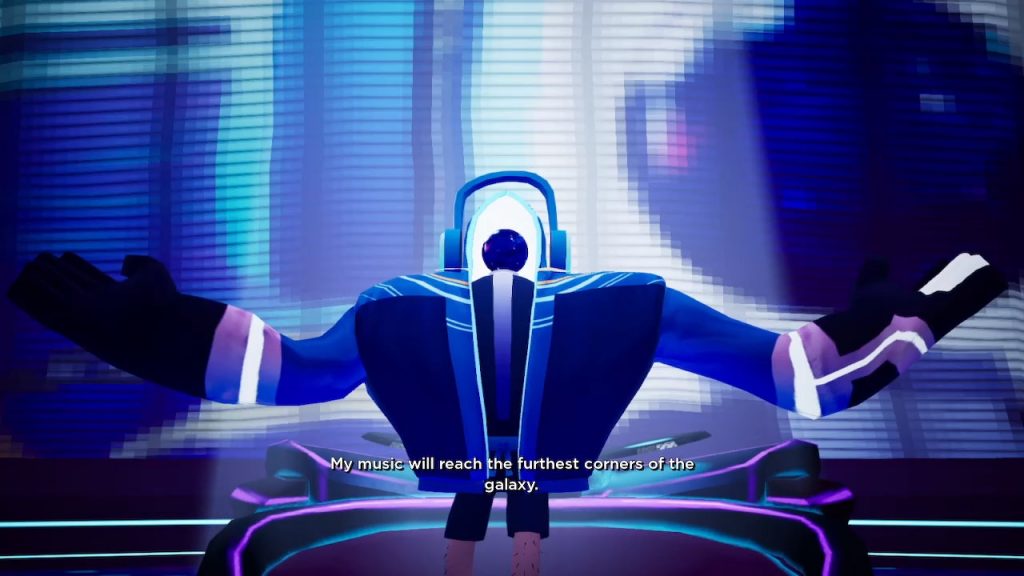
As for the game’s voice acting, it’s a very charming affair. Being Malaysian made, it’s interesting to see how the local voice talent have all managed to affect different accents to a fairly impressive degree. The actor in charge of Mayday puts on a bubbly American twang which slips fairly often but that only adds to the charm. Most of the villains, true to tradition, all boast thick, posh, English accents (thank you, Disney). These also slip occasionally but that only helps to shine a light on the impressive pedigree here. These Malaysian actors are doing an astonishing job both in terms of accent and full embodying these absurd, campy characters. They fully commit to their hammy lines and do so with gusto. It is undeniably sweet and inspiring.
The game also shines in the visuals department, for the most part. Vinyl City doesn’t pop one hundred percent of the time, but certain districts do look impressive (not so much in terms of sheer graphical power, but certainly in the design and style department). In fact, on a few occasions, you may even find yourself stopping to admire the Tokyo-inspired neon streets. Even the character designs pop with enough vibrancy and individuality to impress anyone who is a fan of modern cartoon character designs. Although, Mayday’s eyes are undeniably creepy.
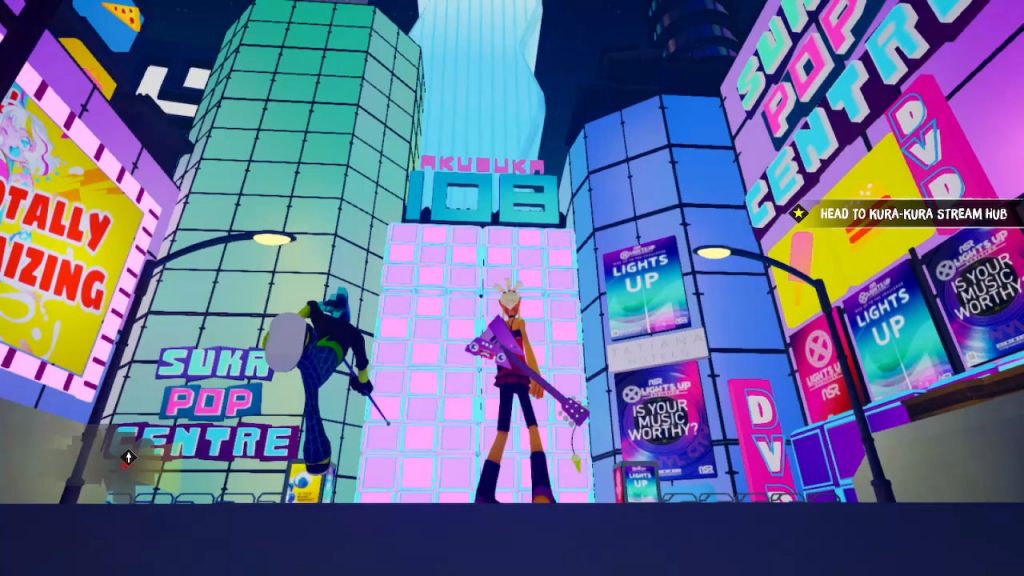
The game’s performance is a little rougher, however. The framerate can get pretty jarring and stuttery in places, and technical grievances which have bugged this genre since its inception still exist. We’re talking awkward cameras leading to unclear object placement and uncertain leaps of faith in the platforming. The swing of a drumstick will often miss because the angle of the shot makes decent depth perception impossible. These issues were there in Crash Bandicoot’s day and they’re here now.
If you take No Straight Roads on its presentation alone, it’s a decent piece of art. The visuals pop and sparkle with imagination, and the soundtrack is an absolute treat for the ears. However, the driving force of every video game is its interactivity, and the gameplay of No Straight Roads is boring at best and broken at worst. If it were a cartoon, No Straight Roads would have a lot more merit. The character and world design is top-notch and the soundtrack would make it one of the finest cartoons around in terms of audio quality. But No Straight Roads is a game, at the end of the day, and as a game it doesn’t hold up to scrutiny.
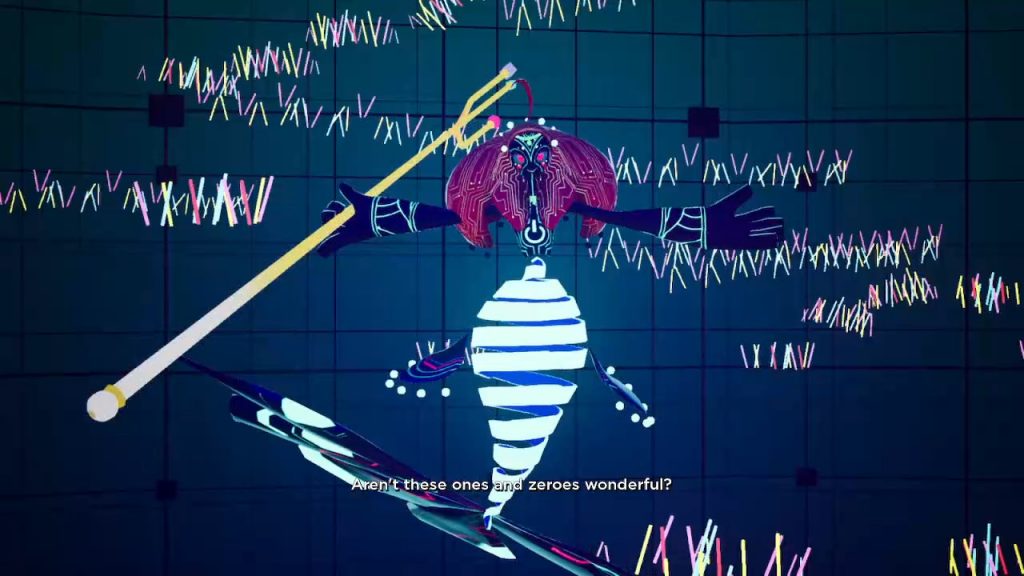
In terms of value, there are games within this genre that are setting the world alight. Unfortunately, No Straight Roads isn’t A Hat in Time or Yooka Laylee and the Impossible Lair. It has a lot going for it in certain departments, but not where it really counts.
Video games can offer everything that other visual mediums can: a driving narrative, compelling protagonists, a thumping soundtrack, and creative design direction. What sets them apart is their interactivity. Take that out of the question and No Straight Roads is a sweet and charming piece of art with its heart in the right place. In terms of art and music, the team behind the game have talent to spare. But gameplay is what matters, when all’s said and done, and it’s the gameplay that really lets No Straight Roads down, rendering it an awkward, derivative game that offers little enjoyment or satisfaction.
Paratopic Review provided by NintendoLink
Review also available on OpenCritic
Publisher: Sold Out
Developer: Metronomik
Release Date: August 25, 2020
Price: $39.99, £34.99, €39.99
Game Size: 4.7 GB
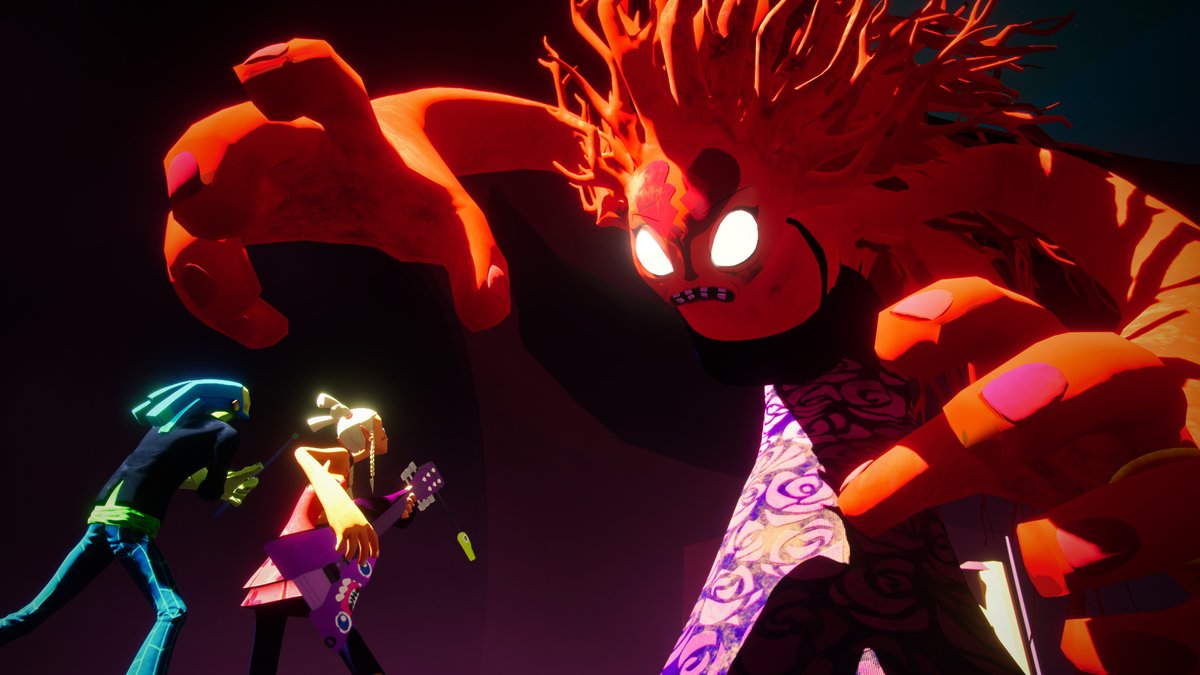
A thumping, dynamic, and evolving soundtrack
Inspired and creative visuals packed with colour
Loveable characters with campy charm
A broken, sluggish combat system
An awkward, at times cringeworthy, narrative
Unpredictable, imprecise platforming mechanics
What's Your Reaction?
Will Heath is a freelance writer and digital nomad from the UK who mostly splits his time between London and Tokyo. He runs the website Books & Bao – a site dedicated to international literature and world travel – and writes about video games for Nintendo Link and Tokyo Weekender.






